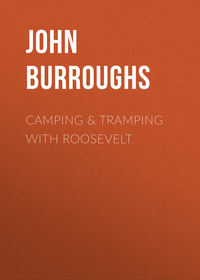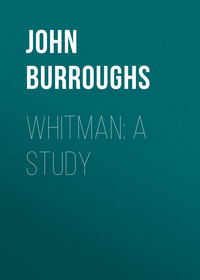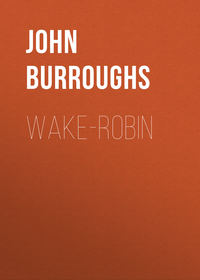 полная версия
полная версияFresh Fields
"Daily and hourly," he says (at the age of thirty-eight), "the world natural grows more of a world magical to me; this is as it should be. Daily, too, I see that there is no true poetry but in reality."
"The gist of my whole way of thought," he says again, "is to raise the natural to the supernatural." To his brother John he wrote in 1832: "I get more earnest, graver, not unhappier, every day. The whole creation seems more and more divine to me, the natural more and more supernatural." His eighty-five years did not tame him at all, did not blunt his conception of the "fearfulness and wonderfulness of life." Sometimes an opiate or an anæsthetic operates inversely upon a constitution, and, instead of inducing somnolence, makes the person wildly wakeful and sensitive. The anodyne of life acted this way upon Carlyle, and, instead of quieting or benumbing him, filled him with portentous imaginings and fresh cause for wonder. There is a danger that such a mind, if it takes to literature, will make a mess of it. But Carlyle is saved by his tremendous gripe upon reality. Do I say the ideal and the real were one with him? He made the ideal the real, and the only real. Whatever he touched he made tangible, actual, and vivid. Ideas are hurled like rocks, a word blisters like a branding-iron, a metaphor transfixes like a javelin. There is something in his sentences that lays hold of things, as the acids bite metals. His subtle thoughts, his marvelous wit, like the viewless gases of the chemist, combine with a force that startles the reader.
Carlyle differs from the ordinary religious enthusiast in the way he bares his bosom to the storm. His attitude is rather one of gladiatorial resignation than supplication. He makes peace with nothing, takes refuge in nothing. He flouts at happiness, at repose, at joy. "There is in man a higher than love of happiness; he can do without happiness, and instead thereof find blessedness." "The life of all gods figures itself to us as a sublime sadness, – earnestness of infinite battle against infinite labor. Our highest religion is named the 'Worship of Sorrow.' For the Son of Man there is no noble crown, well worn or even ill worn, but is a crown of thorns." His own worship is a kind of defiant admiration of Eternal Justice. He asks no quarter, and will give none. He turns upon the grim destinies a look as undismayed and as uncompromising as their own. Despair cannot crush him; he will crush it. The more it bears on, the harder he will work. The way to get rid of wretchedness is to despise it; the way to conquer the devil is to defy him; the way to gain heaven is to turn your back upon it, and be as unflinching as the gods themselves. Satan may be roasted in his own flames; Tophet may be exploded with its own sulphur. "Despicable biped!" (Teufelsdrökh is addressing himself.) "What is the sum total of the worst that lies before thee? Death? Well, death; and say the pangs of Tophet, too, and all that the devil and man may, will, or can do against thee! Hast thou not a heart? Canst thou not suffer what so it be, and as a child of freedom, though outcast, trample Tophet itself under thy feet while it consumes thee? Let it come, then; I will meet it and defy it." This is the "Everlasting No" of Teufelsdrökh, the annihilation of self. Having thus routed Satan with his own weapons, the "Everlasting Yea" is to people his domain with fairer forms; to find your ideal in the world about you. "Thy condition is but the stuff thou art to shape that same ideal out of; what matters whether such stuff be of this sort or of that, so the form thou give it be heroic, be poetic?" Carlyle's watchword through life, as I have said, was the German word Entsagen, or renunciation. The perfect flower of religion opens in the soul only when all self-seeking is abandoned. The divine, the heroic attitude is: "I ask not Heaven, I fear not Hell; I crave the truth alone, withersoever it may lead." "Truth! I cried, though the heavens crush me for following her; no falsehood, though a celestial lubberland were the price of apostasy." The truth, – what is the truth? Carlyle answers: That which you believe with all your soul and all your might and all your strength, and are ready to face Tophet for, – that, for you, is the truth. Such a seeker was he himself. It matters little whether we agree that he found it or not. The law of this universe is such that where the love, the desire, is perfect and supreme, the truth is already found. That is the truth, not the letter but the spirit; the seeker and the sought are one. Can you by searching find out God? "Moses cried, 'When, O Lord, shall I find thee? God said, Know that when thou hast sought thou hast already found me.'" This is Carlyle's position, so far as it can be defined. He hated dogma as he hated poison. No direct or dogmatic statement of religious belief or opinion could he tolerate. He abandoned the church, for which his father designed him, because of his inexorable artistic sense; he could not endure the dogma that the church rested upon, the pedestal of clay upon which the golden image was reared. The gold he held to, as do all serious souls, but the dogma of clay he quickly dropped. "Whatever becomes of us," he said, referring to this subject in a letter to a friend when he was in his twenty-third year, "never let us cease to behave like honest men."
IV
Carlyle had an enormous egoism, but to do the work he felt called on to do, to offset and withstand the huge, roaring, on-rushing modern world as he did, required an enormous egoism. In more senses than one do the words applied to the old prophet apply to him: "For, behold, I have made thee this day a defenced city, and an iron pillar, and brazen walls against the whole land, against the kings of Judah, against the princes thereof, against the priests thereof, and against the people of the land." He was a defenced city, an iron pillar, and brazen wall, in the extent to which he was riveted and clinched in his own purpose and aim, as well as in his attitude of opposition or hostility to the times in which he lived.
Froude, whose life of Carlyle in its just completed form, let me say here, has no equal in interest or literary value among biographies since his master's life of Sterling, presents his hero to us a prophet in the literal and utilitarian sense, as a foreteller of the course of events, and says that an adequate estimate of his work is not yet possible. We must wait and see if he was right about democracy, about America, universal suffrage, progress of the species, etc. "Whether his message was a true message remains to be seen." "If he was wrong he has misused his powers. The principles of his teaching are false. He has offered himself as a guide upon a road of which he had no knowledge; and his own desire for himself would be the speediest oblivion both of his person and his works."
But the man was true; there can be no doubt about that, and when such is the case the message may safely be left to take care of itself. We have got the full force and benefit of it in our own day and generation, whether our "cherished ideas of political liberty, with their kindred corollaries," prove illusions or not. All high spiritual and prophetic utterances are instantly their own proof and justification, or they are naught. Does Mr. Froude really mean that the prophecies of Jeremiah and Isaiah have become a part of the permanent "spiritual inheritance of mankind" because they were literally fulfilled in specific instances, and not because they were true from the first and always, as the impassioned yearnings and uprisings and reachings-forth of high God-burdened souls at all times are true? Regarded merely as a disturbing and overturning force, Carlyle was of great value. There never was a time, especially in an era like ours, when the opinion and moral conviction of the race did not need subsoiling, loosening up from the bottom, – the shock of rude, scornful, merciless power. There are ten thousand agencies and instrumentalities titillating the surface, smoothing, pulverizing, and vulgarizing the top. Chief of these is the gigantic, ubiquitous newspaper press, without character and without conscience; then the lyceum, the pulpit, the novel, the club, – all cultivating the superficies, and helping make life shallow and monotonous. How deep does the leading editorial go, or the review article, or the Sunday sermon? But such a force as Carlyle disturbs our complacency. Opinion is shocked, but it is deepened. The moral and intellectual resources of all men have been added to. But the literal fulfillment and verification of his prophecies, – shall we insist upon that? Is not a prophet his own proof, the same as a poet? Must we summon witnesses and go into the justice-court of fact? The only questions to be asked are: Was he an inspired man? was his an authoritative voice? did he touch bottom? was he sincere? was he grounded and rooted in character? It is not the stamp on the coin that gives it its value, though on the bank-note it is. Carlyle's words were not promises, but performances; they are good now if ever. To test him by his political opinions is like testing Shakespeare by his fidelity to historical fact in his plays, or judging Lucretius by his philosophy, or Milton or Dante by their theology. Carlyle was just as distinctively an imaginative writer as were any of these men, and his case is to be tried on the same grounds. It is his utterances as a seer touching conduct, touching duty, touching nature, touching the soul, touching life, that most concern us, – the ideal to be cherished, the standard he held to.
Carlyle was a poet touched with religious wrath and fervor, and he confronted his times and country as squarely and in the same spirit as did the old prophets. He predicts nothing, foretells nothing, except death and destruction to those who depart from the ways of the Lord, or, in modern phrase, from nature and truth. He shared the Hebraic sense of the awful mystery and fearfulness of life and the splendor and inexorableness of the moral law. His habitual mood was not one of contemplation and enjoyment, but of struggle and "desperate hope." The deep biblical word fear, – fear of the Lord, – he knew what that meant, as few moderns did.
He was antagonistic to his country and his times, and who would have had him otherwise? Let him be the hammer on the other side that clinches the nail. He did not believe in democracy, in popular sovereignty, in the progress of the species, in the political equality of Jesus and Judas; in fact, he repudiated with mingled wrath and sorrow the whole American idea and theory of politics: yet who shall say that his central doctrine of the survival of the fittest, the nobility of labor, the exaltation of justice, valor, pity, the leadership of character, truth, nobility, wisdom, etc., is really and finally inconsistent with, or inimical to, that which is valuable and permanent and formative in the modern movement? I think it is the best medicine and regimen for it that could be suggested, – the best stay and counterweight. For the making of good democrats, there are no books like Carlyle's, and we in America need especially to cherish him, and to lay his lesson to heart.
It is his supreme merit that he spoke with absolute sincerity; not according to the beliefs, traditions, conventionalities of his times, for they were mostly against him, but according to his private and solemn conviction of what the will of his Maker with reference to himself was. The reason why so much writing and preaching sounds hollow and insincere compared with his is that the writers and speakers are mostly under the influence of current beliefs or received traditions; they deliver themselves of what they have been taught, or what is fashionable and pleasant; they draw upon a sort of public fund of conviction and sentiment and not at all from original private resources, as he did. It is not their own minds or their own experience they speak from, but a vague, featureless, general mind and general experience. We drink from a cistern or reservoir and not from a fountain-head. Carlyle always takes us to the source of intense personal and original conviction. The spring may be a hot spring, or a sulphur spring, or a spouting spring, – a geyser, as Froude says, shooting up volumes of steam and stone, – or the most refreshing and delicious of fountains (and he seems to have been all these things alternately); but in any case it was an original source and came from out the depths, at times from out the Plutonic depths.
He bewails his gloom and loneliness, and the isolation of his soul in the paths in which he was called to walk. In many ways he was an exile, a wanderer, forlorn or uncertain, like one who had missed the road, – at times groping about sorrowfully, anon desperately hewing his way through all manner of obstructions. He presents the singular anomaly of a great man, of a towering and unique genius, such as appears at intervals of centuries, who was not in any sense representative, who had no precursors and who left no followers, – a man isolated, exceptional, towering like a solitary peak or cone set over against the main ranges. He is in line with none of the great men, or small men, of his age and country. His message is unwelcome to them. He is an enormous reaction or rebound from the all-leveling tendencies of democracy. No wonder he thought himself the most solitary man in the world, and bewailed his loneliness continually. He was the most solitary. Of all the great men his race and country have produced, none, perhaps, were quite so isolated and set apart as he. None shared so little the life and aspirations of their countrymen, or were so little sustained by the spirit of their age. The literature, the religion, the science, the politics of his times were alike hateful to him. His spirit was as lonely as a "peak in Darien." He felt himself on a narrow isthmus of time, confronted by two eternities, – the eternity past and the eternity to come. Daily and hourly he felt the abysmal solitude that surrounded him. Endowed with the richest fund of sympathy, and yet sympathizing with so little; burdened with solicitude for the public weal, and yet in no vital or intimate relation with the public he would serve; deeply absorbed in the social and political problems of his time, and yet able to arrive at no adequate practical solution of them; passionately religious, and yet repudiating all creeds and forms of worship; despising the old faiths, and disgusted with the new; honoring science, and acknowledging his debt to it, yet drawing back with horror from conclusions to which science seemed inevitably to lead; essentially a man of action, of deeds, of heroic fibre, yet forced to become a "writer of books;" a democrat who denounced democracy; a radical who despised radicalism; "a Puritan without a creed."
These things measure the depth of his sincerity; he never lost heart or hope, though heart and hope had so little that was tangible to go upon. He had the piety and zeal of a religious devotee, without the devotee's comforting belief; the fiery earnestness of a reformer, without the reformer's definite aims; the spirit of science, without the scientific coolness and disinterestedness; the heart of a hero, without the hero's insensibilities; he had strugglings, wrestlings, agonizings, without any sense of victory; his foes were invisible and largely imaginary, but all the more terrible and unconquerable on that account. Verily was he lonely, heavy laden, and at best full of "desperate hope." His own work, which was accomplished with such pains and labor throes, gave him no satisfaction. When he was idle, his demon tormented him with the cry, "Work, work;" and when he was toiling at his tasks, his obstructions, torpidities, and dispiritments nearly crushed him.
It is probably true that he thought he had some special mission to mankind, something as definite and tangible as Luther had. His stress and heat of conviction were such as only the great world-reformers have been possessed of. He was burdened with the sins and follies of mankind, and must mend them. His mission was to mend them, but perhaps in quite other ways than he thought. He sought to restore an age fast passing, – the age of authority, the age of the heroic leader; but toward the restoration of such age he had no effect whatever. The tide of democracy sweeps on. He was like Xerxes whipping the sea. His real mission he was far less conscious of, for it was what his search for the hero implied and brought forward that he finally bequeathed us. If he did not make us long for the strong man to rule over us, he made us love all manly and heroic qualities afresh, and as if by a new revelation of their value. He made all shallownesses and shams wear such a face as they never before wore. He made it easier for all men to be more truthful and earnest. Hence his final effect and value was as a fountain of fresh moral conviction and power. The old stock truths perpetually need restating and reapplying on fresh grounds and in large and unexpected ways. And how he restated them and reinforced them! veracity, sincerity, courage, justice, manliness, religiousness, – fairly burning them into the conscience of his times. He took the great facts of existence out of the mouths of priests, out of their conventional theological swathing, where they were fast becoming mummified, and presented them quick or as living and breathing realities.
It may be added that Carlyle was one of those men whom the world can neither make nor break, – a meteoric rock from out the fiery heavens, bound to hit hard if not self-consumed, and not looking at all for a convenient or a soft place to alight, – a blazing star in his literary expression, but in his character and purpose the most tangible and unconquerable of men. "Thou, O World, how wilt thou secure thyself against this man? Thou canst not hire him by thy guineas, nor by thy gibbets and law penalties restrain him. He eludes thee like a Spirit. Thou canst not forward him, thou canst not hinder him. Thy penalties, thy poverties, neglects, contumelies: behold, all these are good for him."
XI
AT SEA
One does not seem really to have got out-of-doors till he goes to sea. On the land he is shut in by the hills, or the forests, or more or less housed by the sharp lines of his horizon. But at sea he finds the roof taken off, the walls taken down; he is no longer in the hollow of the earth's hand, but upon its naked back, with nothing between him and the immensities. He is in the great cosmic out-of-doors, as much so as if voyaging to the moon or to Mars. An astronomic solitude and vacuity surround him; his only guides and landmarks are stellar; the earth has disappeared; the horizon has gone; he has only the sky and its orbs left; this cold, vitreous, blue-black liquid through which the ship plows is not water, but some denser form of the cosmic ether. He can now see the curve of the sphere which the hills hid from him; he can study astronomy under improved conditions. If he was being borne through the interplanetary spaces on an immense shield, his impressions would not perhaps be much different. He would find the same vacuity, the same blank or negative space, the same empty, indefinite, oppressive out-of-doors.
For it must be admitted that a voyage at sea is more impressive to the imagination than to the actual sense. The world is left behind; all standards of size, of magnitude, of distance, are vanished; there is no size, no form, no perspective; the universe has dwindled to a little circle of crumpled water, that journeys with you day after day, and to which you seem bound by some enchantment. The sky becomes a shallow, close-fitting dome, or else a pall of cloud that seems ready to descend upon you. You cannot see or realize the vast and vacant surrounding; there is nothing to define it or set it off. Three thousand miles of ocean space are less impressive than three miles bounded by rugged mountains walls. Indeed, the grandeur of form, of magnitude, of distance, of proportion, are only upon shore. A voyage across the Atlantic is an eight or ten day sail through vacancy. There is no sensible progress; you pass no fixed points. Is it the steamer that is moving, or is it the sea? or is it all a dance and illusion of the troubled brain? Yesterday, to-day, and to-morrow, you are in the same parenthesis of nowhere. The three hundred or more miles the ship daily makes is ideal, not real. Every night the stars dance and reel there in the same place amid the rigging; every morning the sun comes up from behind the same wave, and staggers slowly across the sinister sky. The eye becomes a-hunger for form, for permanent lines, for a horizon wall to lift up and keep off the sky, and give it a sense of room. One understands why sailors become an imaginative and superstitious race; it is the reaction from this narrow horizon in which they are pent, – this ring of fate surrounds and oppresses them. They escape by invoking the aid of the supernatural. In the sea itself there is far less to stimulate the imagination than in the varied forms and colors of the land. How cold, how merciless, how elemental it looks!
The only things that look familiar at sea are the clouds. These are messengers from home, and how weary and disconsolate they appear, stretching out along the horizon, as if looking for a hill or mountain-top to rest upon, – nothing to hold them up, – a roof without walls, a span without piers. One gets the impression that they are grown faint, and must presently, if they reach much farther, fall into the sea. But when the rain came, it seemed like mockery or irony on the part of the clouds. Did one vaguely believe, then, that the clouds would respect the sea, and withhold their needless rain? No, they treated it as if it were a mill-pond, or a spring-run, too insignificant to make any exceptions to.
One bright Sunday, when the surface of the sea was like glass, a long chain of cloud-mountains lay to the south of us all day, while the rest of the sky was clear. How they glowed in the strong sunlight, their summits shining like a bouquet of full moons, and making a broad, white, or golden path upon the water! They came out of the southwest, an endless procession of them, and tapered away in the east. They were the piled, convoluted, indolent clouds of midsummer, – thunder-clouds that had retired from business; the captains of the storm in easy undress. All day they filed along there, keeping the ship company. How the eye reveled in their definite, yet ever-changing, forms! Their under or base line was as straight and continuous as the rim of the ocean. The substratum of air upon which they rested was like a uniform layer of granite rock, invisible, but all-resisting; not one particle of these vast cloud-mountains, so broken and irregular in their summits, sank below this aerial granite boundary. The equilibrium of the air is frequently such that the under-surface of the clouds is like a ceiling. It is a fair-weather sign, whether upon the sea or upon the land. One may frequently see it in a mountainous district, when the fog-clouds settle down, and blot out all the tops of the mountains without one fleck of vapor going below a given line which runs above every valley, as uniform as the sea-level. It is probable that in fair weather the atmosphere always lies in regular strata in this way, and that it is the displacement and mixing up of these by some unknown cause that produces storms.
As the sun neared the horizon these cloud-masses threw great blue shadows athwart each other, which afforded the eye a new pleasure.
Late one afternoon the clouds assumed a still more friendly and welcome shape. A long, purple, irregular range of them rose up from the horizon in the northwest, exactly stimulating distant mountains. The sun sank behind them, and threw out great spokes of light as from behind my native Catskills. Then gradually a low, wooded shore came into view along their base. It proved to be a fog-bank lying low upon the water, but it copied exactly, in its forms and outlines, a flat, umbrageous coast. You could see distinctly where it ended, and where the water began. I sat long on that side of the ship, and let my willing eyes deceive themselves. I could not divest myself of the comfortable feeling inspired by the prospect. It was to the outward sense what dreams and reveries are to the inward. That blind, instinctive love of the land, – I did not know how masterful and involuntary the impulse was, till I found myself warming up toward that phantom coast. The empty void of the sea was partly filled, if only with a shadow. The inhuman desolation of the ocean was blotted out for a moment, in that direction at least. What phantom-huggers we are upon sea or upon land! It made no difference that I knew this to be a sham coast. I could feel its friendly influence all the same, even when my back was turned.









